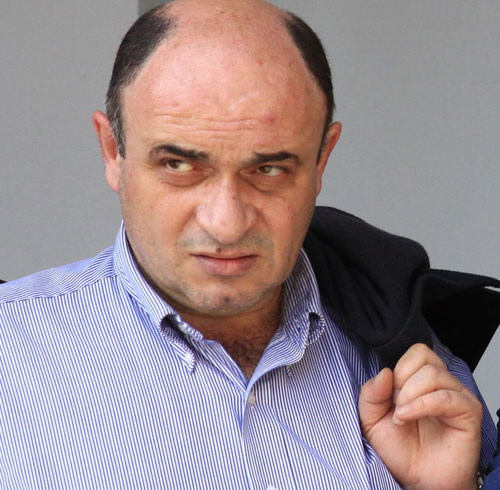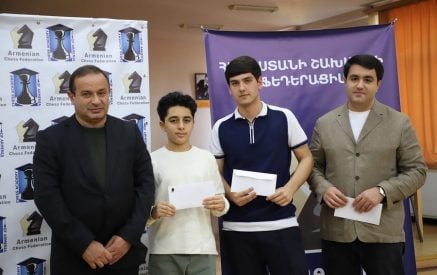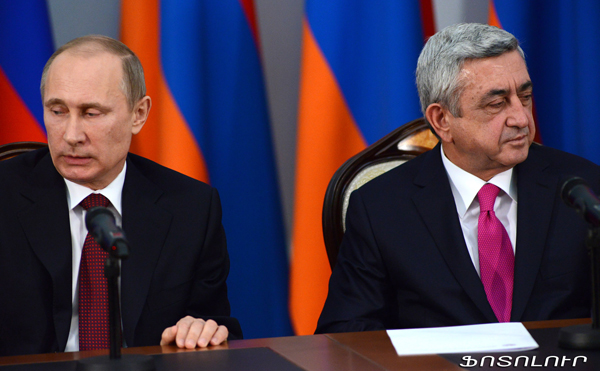According to political analyst Aghasi Yenokyan, “Putin was pointing out our Freedom Square and saying to Serzh Sargsyan, you are not coming, they will come.”
– Mr. Yenokyan, if we summarize the year of 2014, what significant events would you single out?
– In the foreign policy, I think the most important global process was the Russian expansion, aggression in Ukraine, as well as subsequent events, such as the dramatic drop in oil prices and Russia’s, why not, the subsequent rapid deterioration in Armenia’s economy. The other this year’s most important event was the emergence of the “Islamic state”, and now, it seems, we’re hearing its reaction in the Northern Caucasus. Coming to our region, I would single out the two unprecedented aggravations in the Karabakh conflict zone: in August and then in November, the downing of the Armenian helicopter, as well as the intensification of the Karabakh peace process, first, the tripartite meeting in Sochi under the auspices of Vladimir Putin, and then the Wales and Paris meetings.
– What events would you highlight in the internal political arena?
Read also
– I would single out the fact that the “non-government” forces, however, held a rally and then got offended of each other, and afterwards reconciled. Now, a subscription is going on among contenders for the “non-governmental” status. Basically, this process, according to one of the leaders of “non-government” forces, was our undeviated process by the path of the Eurasian Economic Union, which seems to be encountering obstacles, not by our willing, of course.
– Lately, several violence followed one another. How do you explain them? Who could benefit from this kind of atmosphere?
– We are witnessing use of violence against pro-Russian forces. I think that one or two failures by the government officials, perhaps, an attempt was used by other forces to exacerbate the situation, and here, there is some risk that we would go back to the late 90’s, when staging a coup in the country under the name of restraining the growing impetus of violence is not excluded. I think the government authorities would be alert enough to prevent the possibility of such a development. Obviously, there were some coincidences: some representatives of the government used quite vulgar and obscene violence, and it was used by other forces to compare some scenarios elaborated by them.
– If the process of Armenia’s accession to EaEU is unsuccessful, and the EaEU does not become a viable structure, why are we going to this Union? What problem are we going to solve for our country?
– There are two factors to consider, here. First of all, when Serzh Sargsyan made an unexpected turn to the Eurasian Union, what he had on his back, he had a group of “non-government” forces led by Russia and Belarus agents, who were not allowing Serzh Sargsyan to go anywhere, in other words, Putin, at any time, was pointing out our Freedom Square and saying to Serzh Sargsyan, you are not coming, they will come, hence, Armenia does not have a choice, maybe you have a choice but not Armenia… In this regard, I think, really, the “non-government” forces have severely narrowed Armenia’s choice of maneuvering. After that, under its non-choice situation, Armenia had to go by this way. Russia, Belarus and Kazakhstan may already put forward their terms and negotiate with each other about keeping Armenia as a “hostage”, keeping as a tool and periodically putting forwards the issue of Armenia’s accession. In this context, it is important to consider of how a government in general or a state control over another state. There are two main ways: one is the expectation for reward that if you choose the path demanded by a country, then in return, you will be rewarded, and the other one is just the threat, in other words, you realize that if you do not do it, then you will be punished. Given the circumstance of what problems are facing Russia today, it becomes already difficult to understand what reward could be expected from Russia. In other words, why are we going on a journey with this dying state? And vice versa, if Russia is so weak, how can it punish us?
– We usually see this line of reasoning, look at what happened in Ukraine, the issue of preservation of security is raised.
– For rumors, talks or the security reasons, Armenia was forced to enter into the Eurasian Union, I think it’s time to shed light on these talks, let’s see what security threats have been and who was threatened: Armenia, Karabakh or some members of the Armenian leadership elite were threatened by sanctions. It is time to give an answer to these questions.
– Does Armenia’s power have the arena of maneuvering, even if we consider that Russia being in a quite difficult situation, however, manages to put the EaEU into work?
– Maneuvering arena, however, exists. Maneuvering primarily is conditioned by the volatile situation of the Eurasian Union, by the fact that this Union still non-existent is already beginning to dismantled, it also depends on the fact that, now, all countries are in an economic situation that they would not pay attention so much attention on these integration processes rather than to rescue their own “skin”. Eventually, the issue of Armenia’s accession is not yet ratified by the majority of our EaEU friendly countries, and the next, which is much more important, when designing the economy for the next year, when compiling the budget, no one considered the fact of EaEU membership. In other words, many people, even inside the power, do not believe this structure would become a reality.
– Given Russia’s recent policy in post-Soviet countries, Russia’s demonstration of its role, the efforts of enhancement of impact, can we say that the European policy also somehow defeated the Russian one.
– There were huge gaps in the European politics, big mistakes. I think it’s a big mistake that initially, the most sound accord was made when it was said that the policy of “and-and” should not be applied, but only “either-or”. This caused Russia’s serious anti-reaction. The other major mistake was that Europe seems to be playing a “good cop” with Putin and trying to admonish him and bring to senses. It was a confusion. But at the same time, the European policy had one very important achievement: Putin’s ambiguous policy, by and large, did not bring him to what Putin was sought, in other words, did not result in emergence of a gap between Europe and the United States, a distance of vectors between them, but, eventually, they moved forward much more parallel, withstanding the threats by Russia.
– How do you assess the current level of Russo-Turkish and Russian-Azerbaijani relations? What threats do you see in the context of this partnership, particularly in the Karabakh conflict normalization process?
– Currently, Russian-Turkish and Russian-Azerbaijani relations are at a very high level, and they are necessary for all parties. As for the possible threats of the Karabakh conflict, it is just enough that perhaps it was the first time in the entire history of the Karabakh settlement process that during the Sochi meeting, Ilham Aliyev was not against that Russia acts as a sole mediator. In fact, Aliyev was also not against deployment of Russian peacekeepers, and there is a logic in it. Aliyev realizes that Russia is going to collapse, and now, obtaining new borders for him with the hands of Russian peacekeepers and establishing a new status is acceptable. Even if these peacekeepers were deployed for one or two years, it would not cost high to Azerbaijan, because after several years, these peacekeepers together with Russia would leave the region. As for the Russian-Turkish relations and then controversies, of course, they are huge, particularly, in the matter of the “Islamic state” and the Syrian. Turkey, even in secret, but, nevertheless, sponsors the Islamists, while the latter are already announced a major threat for Russia, in particular, for example, associated with Chechnya. On the other hand, it is natural that Russia being expelled from the European market must seek other markets, while Turkey is quite a powerful and purchasing power market, and in this sense, rapprochement between the two countries is natural.
Emma GABRIELYAN
























































